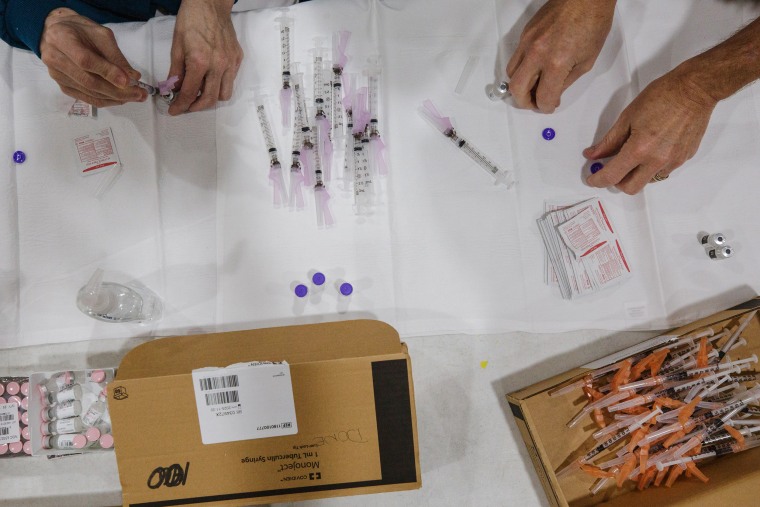The first young children in the pediatric trial of the Pfizer-BioNTech Covid-19 vaccine have received their initial shots, company officials announced Thursday.
The global study of 144 participants will also examine whether the vaccine can generate an immune response in children and determine the proper dosage for each age group in the trial: 6 months to 2 years; 2 years to 5 years; and 5 years to 11 years.
The trial, along with similar studies that Moderna, Johnson & Johnson and others are conducting, aims to guide how the shots should be administered to young children, who are not thought to be the most vulnerable to Covid-19 but can be infected and spread the virus.
During the trial's first phase, three different dosages of the vaccine — 10 micrograms, 20 micrograms and 30 micrograms — will be tested in each age group, beginning with the oldest, the company said. In people ages 16 and older, the Pfizer-BioNTech vaccine is given in two doses of 30 micrograms spaced three weeks apart.
The findings from Phase 1 will determine the dosage level used for later stages of the trial.
In Phases 2 and 3, Pfizer will study whether the vaccine can induce an immune response, how well the shots are tolerated in each age group and monitor for side effects and other safety issues. The later stages of the pediatric trial will expand to include approximately 4,500 children in the United States and Europe, according to Pfizer. Trial participants will be randomly selected to receive either the Pfizer-BioNTech vaccine or a harmless placebo.
Company officials said the trial participants will be monitored for six months after vaccination.
During their original Phase 3 vaccine trial, Pfizer and BioNTech enrolled 2,259 children ages 12 to 15 years old. The companies are expected to release findings from that study soon.
This month, Dr. Anthony Fauci, director of the National Institute of Allergy and Infectious Diseases and the nation's top infectious disease expert, said high school students in the U.S. should be able to receive vaccines by the fall.
"We project that high school students will very likely be able to be vaccinated by the fall term, maybe not the very first day, but certainly in the early part of the fall," Fauci told CBS' "Face the Nation."
He projected that elementary school children will be eligible for the vaccine in the first quarter of 2022, after studies on safety are complete.
Moderna started its trial of children 12 to 17 years old in December, and announced last week that participants received their first doses in Phases 2 and 3 of its trial in children ages 6 months to 11 years old.
Johnson & Johnson is planning to study its single-dose vaccine in children ages 12 to 17, and the company also announced that it intends to eventually test its vaccine in infants and even newborns.
AstraZeneca's Covid-19 vaccine, which is not currently authorized for use in the U.S., is also being tested in children ages 6 to 17 years old.
CORRECTION: (March 25, 2021, 5:58 p.m.): A previous version of this article misstated the age group that Pfizer has vaccinated as part of its pediatric trial. It has started vaccinating the oldest age group, not children as young as six.

